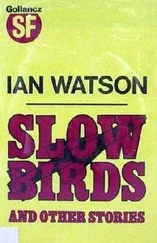Ian Watson - The Embedding
Здесь есть возможность читать онлайн «Ian Watson - The Embedding» весь текст электронной книги совершенно бесплатно (целиком полную версию без сокращений). В некоторых случаях можно слушать аудио, скачать через торрент в формате fb2 и присутствует краткое содержание. Жанр: Фантастика и фэнтези, на английском языке. Описание произведения, (предисловие) а так же отзывы посетителей доступны на портале библиотеки ЛибКат.
- Название:The Embedding
- Автор:
- Жанр:
- Год:неизвестен
- ISBN:нет данных
- Рейтинг книги:4 / 5. Голосов: 1
-
Избранное:Добавить в избранное
- Отзывы:
-
Ваша оценка:
- 80
- 1
- 2
- 3
- 4
- 5
The Embedding: краткое содержание, описание и аннотация
Предлагаем к чтению аннотацию, описание, краткое содержание или предисловие (зависит от того, что написал сам автор книги «The Embedding»). Если вы не нашли необходимую информацию о книге — напишите в комментариях, мы постараемся отыскать её.
The Embedding — читать онлайн бесплатно полную книгу (весь текст) целиком
Ниже представлен текст книги, разбитый по страницам. Система сохранения места последней прочитанной страницы, позволяет с удобством читать онлайн бесплатно книгу «The Embedding», без необходимости каждый раз заново искать на чём Вы остановились. Поставьте закладку, и сможете в любой момент перейти на страницу, на которой закончили чтение.
Интервал:
Закладка:
ONE
CHRIS SOLE dressed quickly. Eileen had already called him once. The second time she called him, the postman had been to the door.
“There’s a letter from Brazil,” she shouted from the foot of the stairs. “It’s from Pierre—”
Pierre? What was he writing for? The news bothered him. Eileen had been so distant and detached since their boy was born-involved in herself and Peter and memories. It wasn’t a detachment he found it particularly easy to break through any more-or, to be frank, that he cared to. So what effect would this letter from her one-time lover have on her? He hoped it wouldn’t be too troublesome.
The landing window gave a quick hint of black fields, other staff houses, the Hospital half a mile away on top of the hill. He glanced momentarily-and shivered with morning misgivings. They often attacked him between waking up and getting to the Hospital.
In the kitchen, three-year-old Peter was making a noisy mess of his breakfast-mashing cornflakes and milk in his bowl, while Eileen stood skimming through the letter.
Sole sat down opposite Peter and buttered a slice of toast. Casually he examined the boy’s face. Didn’t these thin foxy features add up to an image of the Pierre who so many years ago had been photographed as a small boy in a field of marguerites somewhere in France? Already the boy had the same pointed urgency as Pierre, and the glossy brown eyes of a dog fox on the prowl.
Sole’s own face had a sort of phoney distinction about it. It was too well balanced. Slide a mirror up against his nose and he wasn’t split into two different faces, like most people, but a pair of identical twins. This balance of the features was initially impressive, but the end result was a cancelling out of one side of the man by the other, more visible as the years went by.
He glanced at Eileen as she read. She was slightly taller than he was and her eyes had an in-between colour that her last passport described as grey, but which could easily be blue. They’d seemed bluer in Africa-the blue of swimming pools and open skies, which the airmail paper now briefly reflected.
Africa. Those hot still evenings when the open louvres brought no air into their flat and the beer came warm from the overloaded icebox. The brightly-lit university buildings there on the hill, and the yellow glow of the city a dozen miles away by the sea, with the sticky darkness in between syncopated by the mutter of drums. It had been good then, that rapport, that togetherness, before the sadness and the contradictions entered in. Before Pierre slipped over the border into Free Mozambique with Frelimo guerrilla fighters to study the sociology of liberation among the Makonde people on the far side of the Ruvuma river. Before Sole ever heard of the good and profitable destiny awaiting him in this English hospital unit. Before that final diffident encounter with Pierre in Paris four years ago, when Eileen had gone away with the Frenchman for a night and come back the next morning knowing how far their lives had separated and gone down different tracks.
“It seems he’s living with this tribe in the Amazon,” she said, “but they’re being flooded-fighting with poison arrows-and taking drugs—”
“Can I read it?”
She held on to the letter a moment longer, her fingers crumpling the paper to give it a touch of ownership; before surrendering it with a sad lost eroticism of gesture that made him ache, since it wasn’t directed at him. “Shall I read it out?” he asked.
He suspected his voice might rob these lines of the emotional content they possessed for her, so that what had been a love letter would become a mass of folklore and politics. Why do it then? To make some kind of physical contribution to the dialogue of Pierre and Eileen—which he hadn’t been able to join emotionally, though he reaped the fruits of the Frenchman’s ideas? Or to prove that the ideas were more important-and compete with the evidence of love Eileen had, in the shape of Peter? “Eileen?”
“I can’t concentrate right now. He’s getting milk all over the place. Read it yourself-I’ll finish it later—”
Wiping the boy’s mouth with a tissue, she stared at his features intently, then guided his hand on the spoon, picking stray cornflakes up with her other hand and dropping them into her saucer.
Sole cradled his hand round the letter guiltily, like a schoolboy not wanting his answers to be copied, and read.
“You may wonder why I’m using yourselves, Chris and Eileen, to vent my anger on? After so long too! But perhaps you, Chris, will understand when I say that there are some curious threads that lead through years and countries, linking dissimilar people, places and events-is this too mystical a thought for a marxist to entertain?-and that in this case it is that zany surrealist poem of Raymond Roussel’s that we talked about so often in Africa that is the link between yourselves and my own discoveries here and now among one particular Amazon tribe.
“These people have Hobson’s choice-doomed to be drowned if they stay where they are-or else destroyed by a life of tin huts, rum, prostitution and illness, if they’re ‘sensible’ enough to move out of the way of the flood that is even now covering up the whole surface of their world. Need I say nobody cares which option they choose.
“Issues seemed so simple in Africa, compared with here in the heart of Brazil. It was so easy to find an honourable and recognizable role to play in the Mozambique bush. Even the remotest Makonde tribesman knew what the political issues were, was aware of ’Politics’ as such…”
Damn it, he thought, apprehensive at the mention of Roussel’s name. Let Pierre get on trying to reform the world. Just leave me alone to discover what the world really is, how the mind of Man sees the world!
“But how can these Indians perceive any difference between the other Caraiba-that bastard Portuguese word the Indians use for any foreigners, including the European-descended Brazilians themselves-and myself? We’re all outsiders, aliens. Frenchmen, Americans. Right Wing, Left Wing. It’s all the same. Caraiba.
“Those who are aware of Politics, and the Politics of the Amazon Flood, seem so far away, city men occupied with city struggles. Even when they move out into the countryside to fight, what have they got to do with the Indians in their forests? What can they have to do, till the Indians have been destroyed as Indians and become poverty-stricken civilizados?
“So should I be in favour of a human zoo where these ’quaint savages’ can linger on in their interesting savagery? How much it goes against the grain to say, yes maybe-for the Indians there can be no political reply!
“How glad the Brazilian régime is of this distraction foisted on them by the Americans!-the glory of building the greatest inland sea on Earth, the only one of Man’s works visible from the Moon.
“It is a political project, though its victims know nothing of politics-and cannot be made aware of politics without introducing a kind of virus that destroys them. That’s the paradox that sickens me: my own impotence here. I can only record the death of this unique people. Mark up the indictment for the future. And to console myself, listen to my tape of Roussel’s crazy poem…”
Sole shuddered. A hot African sun used to warm their talk of Roussel and it had seemed so innocent and exciting then, the dawning idea of his own research. He remembered the view of red corrugated roofs from a rooftop bar. Shining white plaster walls. Flame trees. A mosque. Peugeots and Volkswagens parked in the dusty street below. The sellers of carvings squatting in shorts and torn shirts while Moslem women passed by on flip-flop sandals, their bodies wrapped in black shrouds, with parcels balanced on their heads. The beer bottles on the tin table slimy with condensation, as Pierre and he talked about a poem that was practically impossible for the human brain to process-which a machine would have to be built to read…
Читать дальшеИнтервал:
Закладка:
Похожие книги на «The Embedding»
Представляем Вашему вниманию похожие книги на «The Embedding» списком для выбора. Мы отобрали схожую по названию и смыслу литературу в надежде предоставить читателям больше вариантов отыскать новые, интересные, ещё непрочитанные произведения.
Обсуждение, отзывы о книге «The Embedding» и просто собственные мнения читателей. Оставьте ваши комментарии, напишите, что Вы думаете о произведении, его смысле или главных героях. Укажите что конкретно понравилось, а что нет, и почему Вы так считаете.












